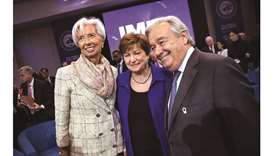Global finance ministers and central bankers pledged to use all their tools, including fiscal policy, to support demand amid a “highly uncertain” outlook and elevated risks.
“The outlook is highly uncertain and subject to elevated downside risks,” including trade tensions, policy uncertainty and geopolitical risks, according to a communique issued Saturday by the International Monetary and Financial Committee, the steering panel of the IMF’s 189 member countries. “We will employ all appropriate policy tools, individually and collectively, to mitigate risks, enhance resilience and shore up growth to benefit all.”
The statement was released in Washington, where the IMF and World Bank are holding their annual meetings.
An International Monetary Fund Committee (IMFC) plenary session on October 18.
“Available fiscal space should be used to support demand as needed,” and monetary policy should aim to keep inflation approaching or stabilising around targets, the communique said.
The downbeat statement caps a week during which the IMF made a fifth-straight cut to its 2019 global growth forecast, projecting the weakest expansion since 2009. The fund’s chief economist, Gita Gopinath, earlier warned that “there is no room for policy mistakes and an urgent need for policymakers to co-operatively de-escalate trade and geopolitical tensions.”
“All tools can be applied — monetary policy where there is space for it” as well as fiscal measures and structural reforms when appropriate, IMF managing director Kristalina Georgieva said on Saturday at a press conference in Washington. Governments need to take these steps to stop or reverse the slowdown, she said.
Global finance leaders met against a backdrop of slowing growth in the world’s major economies and central banks grappling with limited room to support expansion.
In the US, the Federal Reserve has reversed some of its tightening to insure against downside risks, though consumer spending has largely held up amid weakness in manufacturing and business investment. China said on Friday that economic growth decelerated to the weakest pace since the early 1990s, yet it may be starting to stabilise as fiscal stimulus works its way through the economy.
For the euro area, policymakers don’t expect to go beyond the interest-rate cuts and quantitative easing pushed through by European Central Bank President Mario Draghi in September unless the economy is hit by shocks such as escalating trade tensions or a no-deal Brexit, according to regional officials.
While the US and China have touted progress toward a trade agreement that leaders Donald Trump and Xi Jinping would sign next month, the situation remains uncertain and there’s no indication that the nations are preparing to roll back tariffs implemented over the past two years.
The IMFC statement repeated language from the prior statement in April saying that “we recognise the need to resolve trade tensions.”
But the latest missive added a line saying that a “strong international trading system with well-enforced rules addressing current and future challenges would support global growth.”
Global Finance Chiefs Pledge to Use All Tools to Aid Growth

Related tags :


